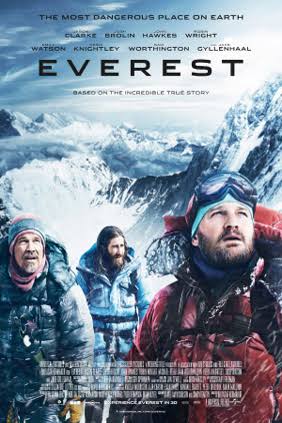by Emma Collins

High above the world stand the peaks of mighty mountains, beacons for humble humans to come and prove their strength, courage, and resilience. Humans are unable to turn away from Mother Nature’s challenges, driven by some unquenchable need to conquer and claim her. But in all her wild glory, she does not go quietly into that good night of submission.
Mount Everest, the world’s highest peak at nearly six miles above sea level (29,029 feet, up there with the cruising altitude of a commercial jet) has claimed more than 250 lives. In all her cold, barren, thin-air rapture the mountain attracts thrill-seekers from across the globe every year to risk their lives for glory. While most deaths are attributed to avalanche, such as the 2015 avalanche triggered by the 7.8 Nepali earthquake that claimed 22 lives on the mountain, many more were horrific climbing accident tragedies.
Baltasar Kormákur’s Everest chronicles the events that took place on May 10 and 11, 1996, when a freak blizzard struck the mountain while climbers were attempting to reach her summit. The movie follows Adventure Consultants, a company that offers professional guides to take climbers to the peak. The commercialization of Everest’s summit is a controversial topic that continues to draw criticism today; the bodies of climbers who perished on the ascent still line the path to the summit. Rob Hall, played by Jason Clarke, first popularized guided Everest climbs and lead a team of climbers during the 1996 events. ) For those unfamiliar with the historic disaster, the following information may spoil the movie.)
Eight people perished in the blizzard, including Hall, whose body still remains on the mountain. Adventure Consultants lost four clients. The movie tells a story of human error, survival, and loss. For those willing to accept historical events being glamorized for Hollywood entertainment, Kormákur offers a stressful adventure that may often leave one feeling breathless with the thin air of impossible peaks. The cast is well chosen, although at times there are lengthy scenes of excessive emotional examination that, while offering a heart-wrenching look into the events, can feel heavy handed. The truth behind the story offers enough emotionally charged reality.
The movie’s portrayal of Everest shows beautiful, barren landscapes contrasted with lush and untamed wilderness, a contrast that underscores the foreignness of one of Earth’s most treacherous landscapes. Scenes of home life, specifically the domesticity of the family of climber Beck Weathers (played by Josh Brolin), help to articulate the almost familiar tone in which such a monumental tragedy is told. These were not strangers beyond the reach of mortal men: they were simple people with extraordinary dreams. Kormákur offers basic medical terminology to help articulate the impossibility of the human body at 30,000 feet, but it is through the sounds of labored breathing, pained cries, and frozen, half-dead stares that the challenge Everest is made plain.
While many specifics surrounding the climbers’ deaths may never be known, it is nonetheless heartbreaking to watch as those men and women, all seeking glory for different means, perish in the face of the unthinkable. Several aspects of the story Kormákur chooses to tell almost cause fury in the watcher, as some climbers die in the face of others’ ignorance. To go into this movie looking for a Sunday evening relaxation is to be foolishly misinformed of just what the story entails.
Entertaining? Yes.
Heartbreaking? Even more so.
Everest attempts to articulate something Hall himself died trying to instill in his climbers: respect the mountain. For in an instant, she can hurl you into oblivion.
Contributing Editor Emma R. Collins of Ashby, Massachusetts, studies English and Psychology at the College of the Holy Cross in Worcester, Massachusetts, and hopes to become a literary editor.
